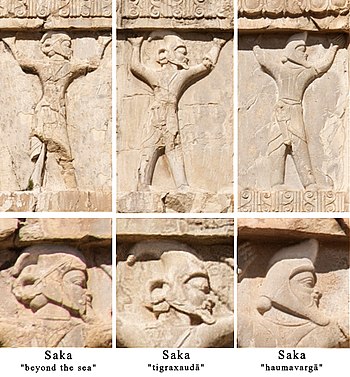𐎿𐎣𐎠 𐏐 𐎫𐎹𐎡𐎹 𐏐 𐎱𐎼𐎭𐎼𐎹
Appearance
Old Persian
[edit]
Etymology
[edit]Literally means "Scythians who are across the Sea", from 𐎿𐎣𐎠 (s-k-a /Sakā/, “Scythian, Sacaean”) + 𐎫𐎹𐎡𐎹 (t-y-i-y /tayaiy/, “who, which”) + 𐎱𐎼𐎭𐎼𐎹 (p-r-d-r-y /paradraya/, “across the sea”),[2] in reference to them living beyond the Black Sea with respect to the Achaemenid Empire.
Compare:
- 𐎹𐎢𐎴𐎠 𐏐 𐎫𐎹𐎡𐎹 𐏐 𐎱𐎼𐎭𐎼𐎹 (Yaunā tayaiy paradraya, literally “Greeks who live across the Sea”)
- 𐎿𐎣𐎡𐎲𐎡𐏁 𐏐 𐎫𐎹𐎡𐎹 𐏐 𐎱𐎼 𐏐 𐎿𐎢𐎥𐎭𐎶 (Sakaibiš tayaiy para Sugdam, literally “Scythians who are beyond Sogdiana”)
- 𐎿𐎣𐎠 𐏐 𐎫𐎡𐎥𐎼𐎧𐎢𐎭𐎠 (Sakā tigraxaudā, literally “Scythians with pointed caps”)
- 𐎿𐎣𐎠 𐏐 𐏃𐎢𐎶𐎺𐎼𐎥𐎠 (Sakā haumavargā, literally “Scythians who lay hauma-plants around (the fire)”)
- 𐎭𐏃𐎹𐎠𐎺 𐏐 𐎫𐎹𐎠 𐏐 𐎱𐎼 𐏐 𐎭𐎼𐎹 (dahyāva tya para draya, literally “Countries which are across the Sea”)
Proper noun
[edit]𐎿𐎣𐎠 𐏐 𐎫𐎹𐎡𐎹 𐏐 𐎱𐎼𐎭𐎼𐎹 (Sakā tayaiy paradraya)
- The Scythians inhabiting the Pontic Steppe
- DNa 24-29
- 𐏐 𐏀𐎼𐎣 𐏐 𐏃𐎼𐎢𐎺𐎫𐎡𐏁 𐏐 𐎰𐎫𐎦𐎢𐏁 𐏐 𐎥𐎭𐎠𐎼𐏐
𐏐 𐏃𐎡𐎯𐎢𐏁 𐏐 𐎿𐎣𐎠 𐏐 𐏃𐎢𐎶𐎺𐎼𐎥𐎠 𐏐 𐎿𐎣𐎠
𐏐 𐎫𐎡𐎥𐎼𐎧𐎢𐎭𐎠 𐏐 𐎲𐎠𐎲𐎡𐎽𐎢𐏁 𐏐 𐎠𐎰𐎢𐎼𐎠
𐏐 𐎠𐎼𐎲𐎠𐎹 𐏐 𐎸𐎢𐎭𐎼𐎠𐎹 𐏐 𐎠𐎼𐎷𐎡𐎴
𐏐 𐎣𐎫𐎱𐎬𐎢𐎣 𐏐 𐎿𐎱𐎼𐎭 𐏐 𐎹𐎢𐎴 𐏐 𐎿𐎣𐎠 𐏐 𐎫𐎹𐎡𐎹 𐏐 𐎱𐎼𐎭𐎼𐎹
𐏐 𐎿𐎤𐎢𐎭𐎼 𐏐 𐎹𐎢𐎴𐎠 𐏐 𐎫𐎣𐎲𐎼𐎠 𐏐 𐎱𐎢𐎫𐎠𐎹𐎠- : z-r-k : h-r-u-v-t-i-š : θ-t-gu-u-š : g-d-a-r :
: h-i-du-u-š : s-k-a : h-u-m-v-r-g-a : s-k-a
: t-i-g-r-x-u-d-a : b-a-b-i-ru-u-š : a-θ-u-r-a
: a-r-b-a-y : mu-u-d-r-a-y : a-r-mi-i-n
: k-t-p-tu-u-k : s-p-r-d : y-u-n : s-k-a : t-y-i-y : p-r-d-r-y
: s-ku-u-d-r : y-u-n-a : t-k-b-r-a : p-u-t-a-y-a - /: Zraⁿka : Harauvatiš : Θataguš : Gaⁿdāra
: Hiⁿduš : Sakā : haumavargā : Sakā
: tigraxaudā : Bābirauš : Aθurā
: Arabāya : Mudrāya : Armina
: Katpatuka : Sparda : Yauna : Sakā : tayaiy : paradraya
: Skudra : Yaunā : takabarā : Putāyā/
[...] Drangiana, Arachosia, Sattagydia, Gandhara,
India, the Scythians who lay around hauma-plants, the Scythians
with pointed caps, Babylon, Assyria,
Arabia, Egypt, Armenia,
Cappadocia, Lydia, Greece, the Scythians who are across the Sea,
Thrace, the Greeks who wear shield-like hats, Libya [...]
- : z-r-k : h-r-u-v-t-i-š : θ-t-gu-u-š : g-d-a-r :
References
[edit]- ^ "HAUMAVARGĀ" in Encyclopædia Iranica, December 15, 2003
- ^ Lexicon
- Text: DNa, Part No. 32, Old Persian Corpus, TITUS: Thesaurus Indogermanischer Text- und Sprachmaterialien

